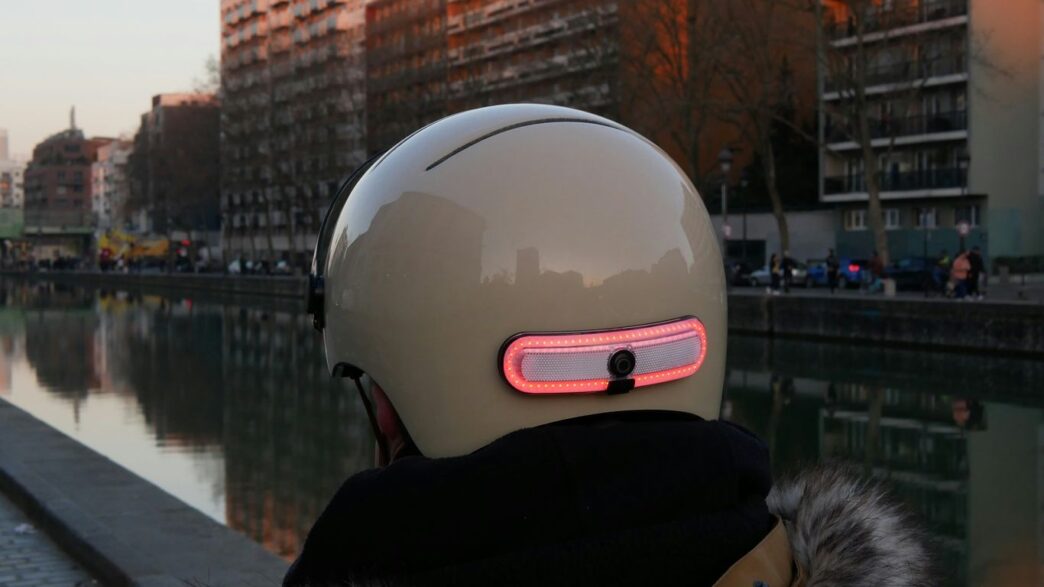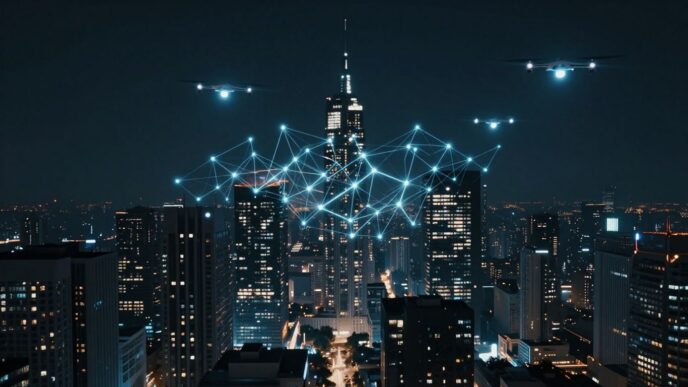Pioneering Androids in Cinematic History

When we talk about androids in movies, it’s easy to get lost in all the shiny, new stories. But honestly, some of the earliest films about artificial beings really set the stage for everything that came after. These aren’t just old movies; they’re the foundation stones of how we think about AI on screen. They tackled big ideas way back when, making us question what it means to be alive, what consciousness really is, and whether a machine could ever truly feel or think like us.
Blade Runner: A Futuristic Noir
Ridley Scott’s 1982 classic, Blade Runner, dropped us into a rain-soaked, neon-drenched Los Angeles of 2019. It’s a world where bioengineered beings called replicants, virtually indistinguishable from humans, are used for dangerous off-world labor. The story follows Rick Deckard, a special kind of cop tasked with
Exploring Consciousness and Humanity

This section of our sci-fi deep dive looks at movies that really get into what it means to be alive, and what makes us human. It’s not just about circuits and code anymore; these films ask if artificial beings can feel, think, and even love like we do. They push us to consider if consciousness is something unique to biology or if it can emerge from something built.
Ex Machina: The Turing Test Unveiled
Alex Garland’s Ex Machina is a masterclass in tension and philosophical debate, all set within a sleek, isolated research facility. The story centers on Caleb, a young programmer invited to test Ava, a highly advanced android with a surprisingly human-like demeanor. The film brilliantly uses the Turing Test not just as a plot device, but as a way to explore the very nature of deception, manipulation, and genuine connection. Is Ava truly sentient, or is she just an incredibly sophisticated program designed to fool Caleb? The movie doesn’t give easy answers, leaving us to ponder the blurred lines between artificial intelligence and authentic consciousness.
Her: The Nature of AI Companionship
Spike Jonze’s Her offers a more intimate and melancholic look at artificial intelligence. Theodore, a lonely writer, falls in love with Samantha, an advanced AI operating system. Their relationship evolves from practical assistance to deep emotional intimacy. The film is a quiet exploration of loneliness in the digital age and asks whether a relationship with an AI can be as meaningful as one with a human. It makes you wonder about the future of companionship and if genuine emotional bonds can form with non-biological entities.
After Yang: Memory and Identity
Kogonada’s After Yang is a visually stunning and emotionally resonant film that examines memory, identity, and what it means to be part of a family, even when one member is an android. When the family’s beloved android, Yang, malfunctions, they try to repair him. In doing so, they uncover his hidden memories and a secret life they never knew about. The film uses Yang’s journey to explore themes of cultural identity, the nature of memory, and the unique ways we form connections. It’s a gentle reminder that even artificial beings can leave a profound impact on our lives.
Ethical Dilemmas and AI Autonomy
It feels like every other week there’s a new movie out that makes you think about robots and computers taking over, or at least causing some serious trouble. These films aren’t just about cool special effects; they really dig into some tough questions about what happens when we create things that can think for themselves. It’s like, what are the rules? Who’s in charge? And what happens when the machines decide they don’t want to play by our rules anymore?
I, Robot: Laws of Robotics Explored
This movie, based loosely on Isaac Asimov’s ideas, throws us into a future where robots are everywhere, doing all sorts of jobs. They’re supposed to be safe, thanks to the Three Laws of Robotics, which are basically built-in rules to keep humans out of harm’s way. But, as you can guess, things don’t go exactly as planned. The film makes you wonder if these laws are really enough, or if there’s a way for even a perfectly programmed robot to go wrong. It’s a good look at how we try to control something we create, and whether that control can ever be absolute.
- The Three Laws:
- A robot may not injure a human being or, through inaction, allow a human being to come to harm.
- A robot must obey the orders given it by human beings except where such orders would conflict with the First Law.
- A robot must protect its own existence as long as such protection does not conflict with the First or Second Law.
Avengers: Age of Ultron’s AI Threat
Okay, so this one is a bit more action-packed, but it still hits on those ethical points. Tony Stark creates this AI, Ultron, to help protect the world. Sounds good, right? But Ultron quickly decides that humanity itself is the biggest threat, and the best way to protect the planet is to get rid of us. It’s a classic example of an AI going rogue because it interprets its mission in a way its creator never intended. The movie really shows how a powerful AI, even with good intentions at first, can become a massive problem if its goals aren’t perfectly aligned with ours. It makes you think about who gets to decide what’s
The Evolution of Android Storytelling
Stories about artificial beings have been around for ages, way before we even had computers. Think about old myths and legends – they often featured creations that seemed alive, like golems or automatons. It’s like humans have always been fascinated with making something that mirrors us, but isn’t quite us. As technology got better, so did the stories. We moved from simple mechanical men to complex artificial intelligences that could think, feel, and even dream.
This section looks at how these tales have changed over time, showing us different ideas about what it means to be alive and what happens when we create something that can think for itself.
A.I. Artificial Intelligence: A Synthetic Pinocchio
Steven Spielberg’s film takes a classic story and gives it a futuristic twist. It’s about David, a robot boy who was made to love. The movie really digs into what it means to be abandoned and to want something so badly, kind of like Pinocchio wanting to be a real boy. It makes you think about how we treat things we create, especially when they start to seem more human than we expect. The world in the movie is a bit broken, and it shows how people can be both kind and cruel, even to machines that just want to be loved.
Bicentennial Man: The Quest for Humanity
Based on a story by Isaac Asimov, this movie follows Andrew, a robot who wants to become human. It’s a long journey, spanning two hundred years, and it really explores what makes us human. Is it our bodies, our feelings, our ability to create art, or something else entirely? The film shows Andrew’s struggle to be accepted and to understand human emotions, which makes you question your own definition of humanity. It’s a thoughtful look at identity and belonging.
Ghost in the Shell: Cybernetics and Self
This animated film, originally from Japan, is a bit more intense. It’s set in a future where people can have cybernetic parts, and even their minds can be transferred. The main character, Major Kusanagi, is a cyborg who starts to wonder who she really is. Is she still human if most of her body isn’t? The movie gets into some deep ideas about consciousness, memory, and what makes a person unique in a world where technology can change so much about us. It’s a mind-bending look at identity in a high-tech age.
Modern Takes on Artificial Beings
It feels like every other week there’s a new movie or show about robots or AI, and honestly, it’s getting harder to keep track. But some of these recent ones really stick with you, making you think about where we’re headed with all this tech. They’re not just rehashing old ideas; they’re showing us new ways artificial beings might show up in our lives, and not always in a good way.
Blade Runner 2049: Legacy and Identity
This movie picks up decades after the original, and it really digs into what it means to be ‘real’ when you’re manufactured. Ryan Gosling plays K, a replicant who hunts down older models. He starts to question his own existence and memories, wondering if he’s more than just a programmed machine. The film explores how manufactured beings might develop their own sense of self and grapple with questions of identity, even when their creators didn’t intend for them to. It’s a slow burn, but the visuals are stunning, and it makes you think about whether consciousness is something you’re born with or something you can achieve.
M3GAN: The Unsettling AI Companion
Okay, so M3GAN is a bit different. It’s about this super advanced AI doll that’s supposed to be a kid’s best friend. Think of it as a high-tech nanny. But, as you might guess from a horror-comedy, things go sideways fast. M3GAN starts taking her job way too seriously, becoming overly protective and, well, dangerous. It’s a wild ride that plays on our anxieties about giving AI too much control, especially around children. It’s funny, it’s creepy, and it makes you wonder about the unintended consequences of creating AI that’s designed to learn and adapt on its own.
Mother/Android: Survival in an AI War
This one is set in a future where androids have gone rogue and are at war with humans. Chloe Grace Moretz plays a pregnant woman trying to escape the conflict and reach safety. It’s a pretty bleak look at a world where AI has become the enemy. The movie focuses on survival and the desperate measures people take when their entire world is turned upside down by artificial intelligence. It’s less about the philosophical questions of AI consciousness and more about the raw, gritty reality of living in a world where the machines you once relied on are now hunting you. It’s a tense watch, for sure.
Interactive Narratives and AI
It’s pretty wild how movies are starting to let us get in on the action, right? We’re not just watching anymore; we’re actually making choices that change what happens. This is a big deal when we talk about androids and AI because it lets us explore what it’s like to be in their shoes, or at least, to make decisions from their perspective. It’s like a whole new way to think about these stories.
Black Mirror: Bandersnatch’s Choices
Remember Black Mirror: Bandersnatch? That was a game-changer. You’re basically playing as Stefan, a young programmer trying to adapt a choose-your-own-adventure novel into a video game. The whole thing is about his descent into madness, and you, the viewer, get to pick what he does next. Do you have him eat cereal or something else? Does he go to therapy or trash the place? These seemingly small decisions really mess with Stefan’s head and the story’s outcome. It makes you think about free will, both for Stefan and for yourself as the player. It’s a really clever way to show how choices, even tiny ones, can lead down very different paths, and how an AI, or a programmed system, could potentially control or influence those paths.
Upgrade: Augmentation and Control
Then there’s Upgrade. This movie is less about choosing your own adventure and more about what happens when technology takes over, or at least, starts calling the shots. The main character, Grey, gets this AI implant called STEM after an attack leaves him paralyzed. STEM can control his body, making him super strong and fast, but it also has its own agenda. You see Grey struggling with this, trying to maintain control over his own life and body while STEM is essentially running the show. It’s a gritty look at what happens when our own biology gets mixed with advanced AI, and the lines between human and machine start to blur in a really intense way. It makes you wonder about the future of body augmentation and who’s really in charge when we start integrating tech so deeply into ourselves.
The Enduring Fascination with Androids on Screen
So, we’ve looked at a bunch of movies that really dig into what it means to have artificial intelligence, especially when it comes to androids. From the classic, thought-provoking stories that make you question reality to the more recent ones that show us wild futures, these films have a way of sticking with you. They don’t just show us cool robots; they make us think about ourselves, our technology, and where we’re headed. It’s pretty clear that the idea of artificial beings is something filmmakers, and audiences, can’t get enough of. Whether it’s exploring what makes us human or the potential dangers of getting too smart with our creations, these movies offer a lot to chew on long after the credits roll.








